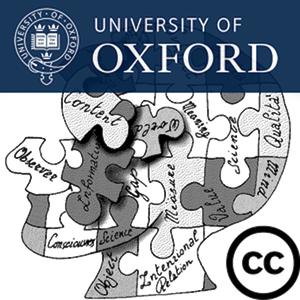
A Romp Through Philosophy for Complete Beginners
Oxford University
In this series of podcasts Marianne Talbot uses some famous arguments in the history of philosophy to examine philosophy as a discipline. By harnessing participants’ intuitions on both sides of the various arguments she encourages her audience actually to do philosophy. In listening to these podcasts you can yourself learn how to do philosophy, not by listening to someone else do it, but by starting to do it for yourself.
- 1 hour 22 minutesQuestions and Answers SessionMarianne answers questions from the audience about the four talks in this series.11 November 2014, 3:57 pm
- The Philosophy of Science (Slides)In the fourth and final lecture, we examine the notion of ‘objective fact’ on which scientific theories are built; what sort of fact is such that we can build a scientific theory on it?11 November 2014, 3:45 pm
- 1 hour 15 minutesThe Philosophy of ScienceIn the fourth and final lecture, we examine the notion of ‘objective fact’ on which scientific theories are built; what sort of fact is such that we can build a scientific theory on it?11 November 2014, 3:45 pm
- Epistemology and Metaphysics (Slides)In the third lecture we examine first the so-called “Gettier Problems” for the traditional account of knowledge, the arguments for saying that possible worlds exist and finally we ask whether there really are unactualised possibles.11 November 2014, 3:42 pm
- 1 hour 17 minutesEpistemology and MetaphysicsIn the third lecture we examine first the so-called “Gettier Problems” for the traditional account of knowledge, the arguments for saying that possible worlds exist and finally we ask whether there really are unactualised possibles.11 November 2014, 3:42 pm
- Moral and Political Philosophy (Slides)In the second lecture we examine first the famous ‘Wilt Chamberlain’ thought experiment that demonstrates a retention between freedom and equality, then arguments for and against two famous moral theories; deontology and utilitarianism.11 November 2014, 3:38 pm
- 1 hour 30 minutesMoral and Political PhilosophyIn the second lecture we examine first the famous ‘Wilt Chamberlain’ thought experiment that demonstrates a retention between freedom and equality, then arguments for and against two famous moral theories; deontology and utilitarianism.11 November 2014, 3:38 pm
- Logic and Argument: the Methodology of Philosophy (Slides)In this first lecture, using Descartes famous argument for the claim “I think therefore I am’, we examine how to identify and evaluate arguments.11 November 2014, 3:37 pm
- 1 hour 23 minutesLogic and Argument: the Methodology of PhilosophyIn this first lecture, using Descartes famous argument for the claim “I think therefore I am’, we examine how to identify and evaluate arguments.11 November 2014, 3:37 pm
- More Episodes? Get the App
Your feedback is valuable to us. Should you encounter any bugs, glitches, lack of functionality or other problems, please email us on [email protected] or join Moon.FM Telegram Group where you can talk directly to the dev team who are happy to answer any queries.
 A Romp Through Ethics for Complete Beginners
A Romp Through Ethics for Complete Beginners
 A Romp Through Ethics for Complete Beginners
A Romp Through Ethics for Complete Beginners
 A Romp Through the Philosophy of Mind
A Romp Through the Philosophy of Mind